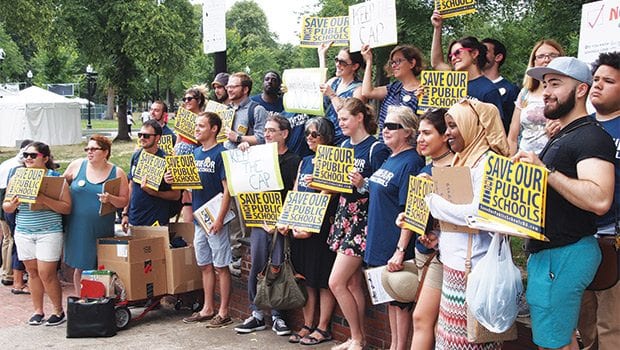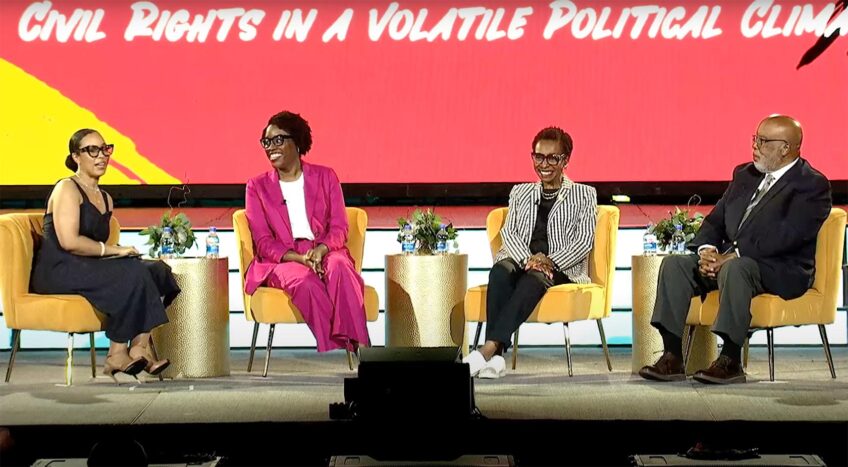
While Donald Trump’s election to the presidency dominated political news of the year, state and city races saw their own changes, and a ballot measure on charter schools drew national attention.

City councilors Michelle Wu, Ayanna Pressley and other returning and entering councilors were sworn in at Faneuil Hall. Wu (l) became the new council president.
City Council
The Boston City Council elected Michelle Wu president, making her the first woman of color to hold the position. Two newcomers joined the council as well: attorney Andrea Campbell as District 4 councilor and former Boston Public Schools teacher Annissa Essaibi-George as at-large councilor.
The newcomers unseated longtime incumbents Stephen Murphy and Charles Yancey. Murphy had served in the at-large position for 18 years, while Yancey served District 4 for 32 years. Yancey’s legacy includes his founding of the Post Audit and Oversight Committee in the 1980s, which was charged with overseeing city spending, hiring and contracting, including keeping an eye on departmental diversity levels.
Committee change-ups included dissolution of the Post Audit and Oversight Committee, with budget oversight responsibilities assigned elsewhere. President Wu also announced a new committee on Homelessness, Mental Health and Poverty, as well as Jobs, Labor and Workforce Development. The Public Safety Committee was expanded to include criminal justice. Campbell took the helm of the revised Public Safety and Criminal Justice Committee, while Essaibi-George became vice chair of the Education Committee.
Murphy went on to win a seven-way race to become Suffolk County Register of Deeds.
Senate seats
Diana Hwang, co-founder of the Asian-American Women’s Political Initiative, faced off against Lydia Edwards, a lawyer with the Greater Boston Legal Services, and other contenders who sought the Democratic nomination for the First Suffolk and Middlesex district state senate seat in a special election. The district includes the North End, Beacon Hill, East Boston, Revere, Winthrop and parts of Cambridge. Neither woman of color won, with Joseph Boncore victorious in both the primary and general election. Edwards subsequently was appointed to head the city’s new Office of Housing Stability.

Chynah Tyler won the Seventh Suffolk District state representative seat long held by Gloria Fox.
State representatives
Longtime Seventh Suffolk District State Rep. Gloria Fox declined to seek reelection for the seat she has held since 1985. Her announcement sparked a competition among three women of color to replace her: Chynah Tyler, former aide to Sen. Sonia Chang-Diaz; Mary-dith Tuitt, Fox’s aide; and Monica Cannon, community liaison for Roca. The district extends from Audubon Circle near Boston University to parts of Back Bay, the Fenway and Roxbury. Tyler won the Democratic primary with 43 percent of the vote, advancing her to run unopposed in the generals and win the seat.
In the Eleventh Suffolk District, 18-year incumbent Liz Malia defeated challenges from Charles Clemons Jr., TOUCH 106.1FM radio co-owner, and from progressive independent candidate Stephen Charles Bedell, a restaurant manager and former attorney.
Incumbent Rep. Evandro Carvalho of the Fifth Suffolk District defeated challengers, as did Twelfth Suffolk District incumbent Rep. Dan Cullinane.
Springfield’s Eleventh Hampden District seat, vacated by Rep. Ben Swann, went to City Councilor Bud Williams. Three other candidates had vied for the position: Ben Swann Jr., Ken Barnett and Larry Lawson.
Rep. Angelo Scaccia, 40-year incumbent of the Fourteenth Suffolk District, ran unopposed after securing the Democratic nomination over Anthony Solimine, a former lawyer, and Virak Uy, a BPS teacher.

Gabriela Pereira, South Boston High School student, addressed Question 2 opponents during a gathering at the Massachusetts Democratic Party’s celebration at the Fairmont Copley Plaza. The defeat of Question 2 maintained the cap on charter schools.
Ballot measures
The future of Boston schools was a hot topic, as proponents of charter school expansion wrestled with opponents who said a cap lift would sap financial vitality from district schools and perhaps the city itself. A lawsuit over the cap attempted to resolve the dispute, as did a legislative compromise proposed by state senators.
The senators’ bill would have raised the cap limit gradually, called for increased state funding for both charter and district schools and created a unified enrollment system in which parents signed up for charters and district school within the same process. Both sides of the charter expansion issue opposed the bill.
Ultimately the debate went to statewide ballot. In the end, the Boston City Council, Boston School Committee and the majority of voters disapproved of lifting the cap.
Residents also overwhelmingly voted to prohibit tight physical confinement of certain farm animals as well as sale of their meat or eggs, legalized recreational adult marijuana and rejected an additional slots parlor. Boston voters implemented the Community Preservation Act, which uses a tax surcharge to generate funding for affordable housing, historic preservation and greenspace.
A proposal to raise the income tax rate on millionaires and direct the revenue toward public education and transportation infrastructure improvements cleared its second of three hurdles when it passed a vote at the state constitutional convention. However, it must be approved at the next ConCon before it can hit the 2018 statewide ballot.






